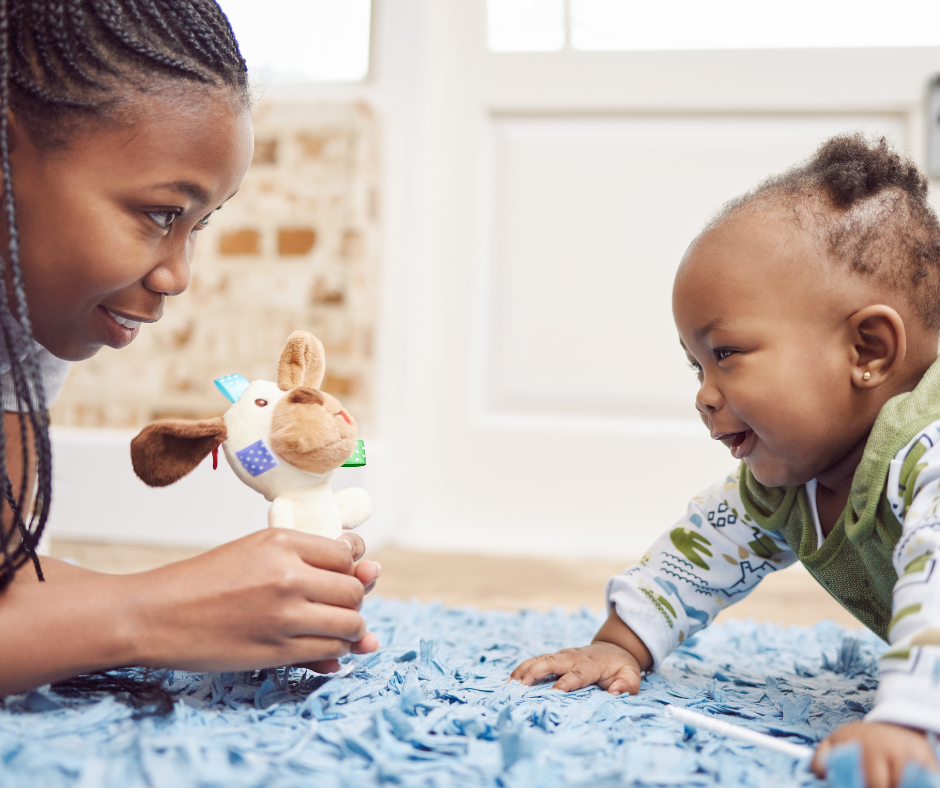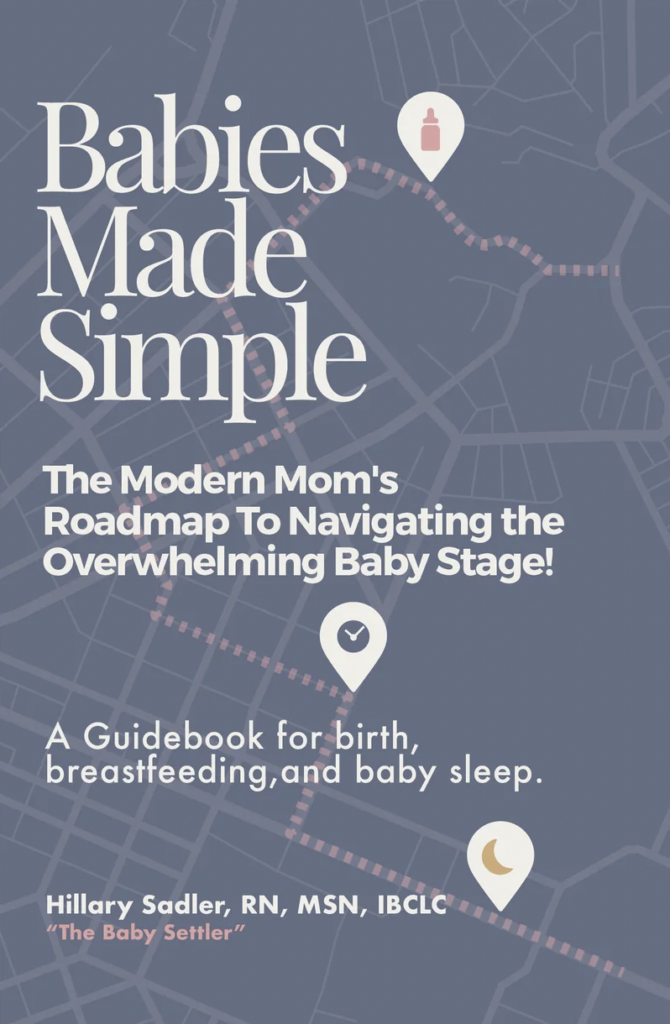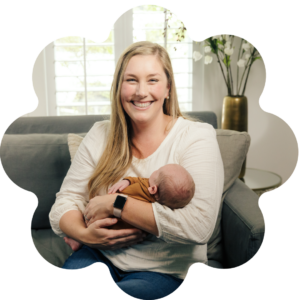
Are you dreaming of a time when your baby will sleep through the night, but are scared of baby sleep training methods? The term ‘crying it out’ (also known as the Ferber Method) doesn’t sit right with many parents! Luckily, there are ways to promote self-soothing and better nighttime sleep that don’t involve tears.
Tip: Taking baby sleep courses can help you navigate your child’s development, including what to do about sleep regressions. Our baby sleep guide, Babies Made Simple, guarantees improved sleep in as little as three days!
At What Age Should A Baby Sleep Through The Night?
First, it’s important to know whether your sleep expectations for your baby are realistic.
As the newborn digestive system can only handle a small amount of milk at a time, they only sleep for one to two hours so that they can feed frequently. When your baby is able to take in more milk during individual feedings, they’re able to sleep for longer periods. At around three months of age, babies are usually able to sleep for six-hour stretches.
“…babies between 4 and 6 months old are developmentally able to sleep through the night without a feeding, but whether they do is another story. Babies, like adults, eat for comfort and pleasure, not just nourishment,” adds What To Expect.
Get a guide to age-appropriate bedtimes and routines here.
How Can I Get My Baby To Sleep Through The Night?
Here are seven tips to help baby sleep:

Quality And Full Feedings
As your baby skips nighttime feeds, it’s important to ensure you’re making up the calories they need during the day.
Sleep and breastfeeding (or bottle feeding) are interconnected – a quality and full feeding before you put your baby down for nighttime sleep will help them sleep for longer. If they only “snack” then they will soon wake up needing to eat again.
Tips to encourage a full feeding:
- Burp your baby before, during, and after the feed to prevent reflux.
- Put your baby to both breasts during breastfeeding.
- Recognize your baby’s hunger cues (licking their lips, opening their mouth, moving their head around).
- Minimize distractions while feeding your baby to make sure they’re concentrating on the task at hand.
One of the best things you can do as a breastfeeding parent to navigate the ups and downs of feeding your baby is to speak with a lactation consultant. You will be able to confidently troubleshoot any issues that may arise through a tailor-made breastfeeding guide. Find out more.
Create An Optimal Sleep Environment
Where your baby sleeps can have a big impact on the quality and length of their nighttime sleep. Add these things to your baby’s nursery:
- Blackout curtains can be extremely helpful in creating a positive environment as they block out light. A dark environment promotes the production of melatonin which helps your baby stay asleep for longer periods.
- A white noise machine can replace distracting outside noises with soothing sounds. Verywell Family says, “White-noise machines create a comfortable, womb-like environment that calms infants, encouraging them to stop crying and fall asleep faster. White-noise machines also help babies stay asleep longer.” Instead of a white noise machine, you could place a fan in your baby’s room. This will also help make the space cooler, which is important for better sleep.
Know When To Drop A Nap
As your baby grows, their sleeping needs change to accommodate longer nighttime sleep.
If your baby is fighting against going to bed at night and they’re still happy and not irritable when nap time rolls around, it may be time to drop a nap.
Your baby’s age is also an indication of the amount of naps they need. Three-month-old babies need around three to five naps a day, four to six-month-old babies need two to three naps, and babies six to 12 months need two naps a day.

Good Daytime Sleep And Stimulating Wake Windows
Don’t completely do away with naps in the name of longer sleep!
Good quality daytime sleep prevents an overtired and overstimulated baby which in turn helps your baby get quality feedings during the day which has a positive impact on sleep. An overstimulated baby will struggle to fall asleep when you put them down at night.
Besides naps, your baby’s wake windows can also impact the quality and length of their sleep. This is when they’re alert and can interact with their environment. It’s important to interact with your baby and have them interact with their surroundings during wake windows. This means tummy time, walks, and generally just interacting with them.
Did you know? Going outside with your baby can positively impact nighttime sleep as the daylight can help their circadian rhythm develop.

Put Your Baby In A Sleep Sack
Babies are often woken from sleep earlier than ideal when not swaddled or in a sleep sack due to the Startle Reflex (that makes them feel like they’re falling!). A sleep sack can help your little one feel more secure and relaxed.
As Cleveland Clinic explains, sleep sacks are safe and healthy for babies, “The bagginess of a sleep sack gives babies room to kick their legs, which is good for their hips.” Plus, blankets pose a risk of suffocation and SIDS; choosing a sleep sack is a safer way to keep your baby warm.
Follow A Consistent Nighttime Routine
To help baby sleep, a nighttime routine is a must.
Doing a few activities consistently can help your baby associate the activities with sleep and relaxation.
The NHS suggests bathing your baby, dimming the lights in the room to create a calm atmosphere, singing them a lullaby, and a goodnight kiss and cuddle.
Take the quiz to unlock a personalized routine!
Differentiate Nighttime Feedings
It’s important to make nighttime feedings different from daytime feedings to encourage your little one to go back to sleep.
This can look like keeping them swaddled or in their sleep sack for their feed, keeping the lights dim, changing their diaper before the feed, and putting them directly back to sleep.

Mama, we know that navigating your baby’s milestones can be challenging! To help you through the first year of parenthood, the book Babies Made Simple: The Modern Mom’s Roadmap To Navigating the Overwhelming Baby Stage is here! This is your roadmap with everything you need to know about sleep and feeding. Get it here!



